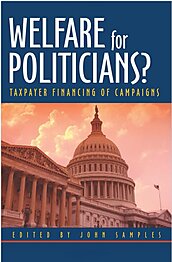Candidates and parties need money to fight election campaigns. In the United States, this money comes largely from individuals and groups—not the government and taxpayers. Many people criticize such private financing of politics. Private donations, they claim, advance special interests, thereby corrupting politics and government. Some critics argue that government should ban private campaign contributions in favor of financing by taxpayers. Since public money comes from everyone, they reason, it actually comes from no one, which cuts out corruption before it begins.
But taxpayer financing of campaigns—such as the income-tax check-off for presidential campaigns—has its share of critics who point out that public financing has often come up short in terms of increasing electoral competition. Another major problem concerns the taxpayers who are called on to fund these programs. Taxpayer financing, in polls and in reality, lacks public support. The public resists giving “welfare to politicians” to run their campaigns.
In Welfare for Politicians, leading analysts from both sides of the public financing debate address the history of these programs, including the successes and failures of the financing system for presidential elections. They also take up recent innovations in the states, including models of full taxpayer financing passed by initiative in Arizona, Maine, and Massachusetts. Together they offer a groundbreaking analysis of the problem and an instructive guide to future reform.
